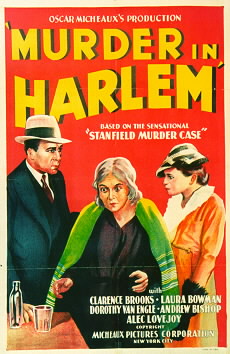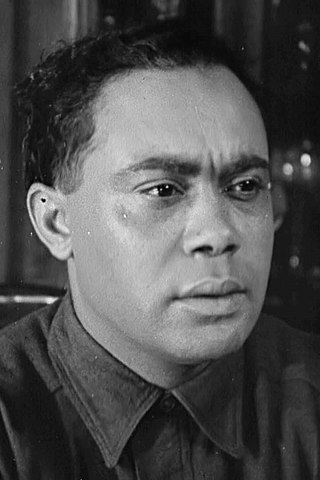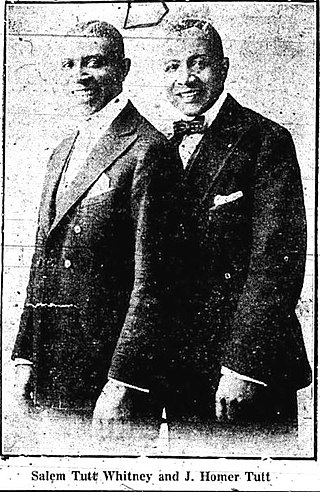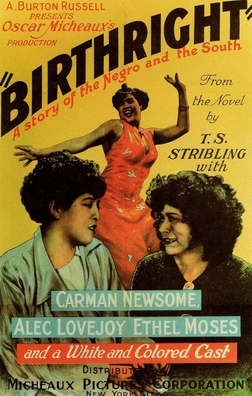Related Research Articles

Within Our Gates is a 1920 American silent race drama film produced, written and directed by Oscar Micheaux. The film portrays the contemporary racial situation in the United States during the early twentieth century, the years of Jim Crow, the revival of the Ku Klux Klan, the Great Migration of blacks to cities of the North and Midwest, and the emergence of the "New Negro".

Oscar Devereaux Micheaux (; was an American author, film director and independent producer of more than 44 films. Although the short-lived Lincoln Motion Picture Company was the first movie company owned and controlled by black filmmakers, Micheaux is regarded as the first major African-American feature filmmaker, a prominent producer of race films, and has been described as "the most successful African-American filmmaker of the first half of the 20th century". He produced both silent films and sound films.

Body and Soul is a 1925 race film produced, written, directed, and distributed by Oscar Micheaux and starring Paul Robeson in his motion picture debut. In 2019, the film was selected by the Library of Congress for inclusion in the National Film Registry for being "culturally, historically, or aesthetically significant".

Evelyn Preer, was an African American pioneering screen and stage actress, and jazz and blues singer in Hollywood during the late-1910s through the early 1930s. Preer was known within the Black community as "The First Lady of the Screen."

The Lincoln Motion Picture Company was an American film production company founded in 1916 by Noble Johnson and George Perry Johnson. Noble Johnson was president of the company, and the secretary was actor Clarence A. Brooks. Dr. James T. Smith was treasurer, and Dudley A. Brooks was the assistant secretary. The company is known as the first producer of race movies. Established in Omaha, Nebraska, the company relocated to Los Angeles the following year. It remained in operation until 1923, closing shortly after announcing a final project, The Heart of a Negro. The point of the creation of Lincoln's was to eliminate the stereotypical roles of "slapstick comedy" in Hollywood at the time for Black actors and actresses. "best advertised and most widely known Race Corporation in the world" is the famous slogan for the company.

Alice Burton Russell was an African-American actress, producer, and the wife of director Oscar Micheaux. She appeared in several films directed by her husband.

Murder in Harlem is a 1935 American race film written, produced and directed by Oscar Micheaux, who also appears in the film. It is a remake of his 1921 silent film The Gunsaulus Mystery.

A Daughter of the Congo is a 1930 race film directed, written and produced by Oscar Micheaux. The film is loosely based on the novel The American Cavalryman (1917), by African-American novelist and playwright Henry Francis Downing. It is considered a lost film.

Richard D. Maurice was a pioneering filmmaker during the silent era. Later, he became involved in labor organizing and helped found the Dining Car and Railroad Food Workers union. He was of African descent.

Salem Tutt Whitney and J. Homer Tutt, known collectively as the Tutt Brothers, were American vaudeville producers, writers, and performers of the late 19th and early 20th century. They were also known as Whitney & Tutt, Tutt & Whitney and the Whitney Brothers. They were prominent in black vaudeville and created over forty revues for black audiences.
Birthright is a 1924 silent film by American director Oscar Micheaux. Produced in 10 reels, it is adapted from Thomas Sigismund Stribling's novel of the same title (1922). The film is now lost.

Birthright is a 1938 American drama film directed, co-produced and co-written by Oscar Micheaux and starring Carman Newsome. This is a talkie remake of Micheaux's 1924 silent film of the same name; both were adapted from white author T. S. Stribling's eponymous 1922 novel. Starring J. Homer Tutt, Micheaux's 1924 film was highly controversial for its graphic depiction of racism. The film is now considered lost.
Easy Street is a 1930 American film by Oscar Micheaux, an African American filmmaker. It features an African American cast. Known as the last silent achievement in his filmography, the film is considered lost. The plot reportedly revolved around a group of con artists trying to seize the savings of an old man.
The Spider's Web is a 1926 American film directed by Oscar Micheaux which stars Evelyn Preer. It was remade in 1932 as The Girl from Chicago.
Andrew S. Bishop (1894–1959) was an actor on stage and screen. He and Cleo Desmond drew adoring fans to their theatrical performances. He starred in several of Oscar Michaux's African American films.

African American cinema is loosely classified as films made by, for, or about Black Americans. Historically, African American films have been made with African-American casts and marketed to African-American audiences. The production team and director were sometimes also African American. More recently, Black films featuring multicultural casts aimed at multicultural audiences have also included American Blackness as an essential aspect of the storyline.
Ten Nights in a Barroom is an American film released in 1926. Directed by Roy Calnek and starring Charles Gilpin, the film had a temperance theme and an African American cast. It followed on Timothy Shay Arthur's 1854 novel Ten Nights in a Bar-Room and What I Saw There and William W. Pratt's play, as well as earlier film adaptations albeit with white casts. A man's drinking causes him to lose money, his business, and his daughter.
Harry Henderson was an actor in theater and films in the United States. He made four films with the Colored Players Film Corporation. He was also cast in several Oscar Micheaux films and had a starring role in the film melodrama The Scar of Shame. He portrays a wealthy concert pianist in the film. He also had a lead role in the 1926 film The Prince of His Race.
The Midnight Ace is a 1928 American crime film. Abe DeComathiere, Mabel Kelly and Oscar Roy Dugas starred. The film was directed by John H. Wade for Swan Micheaux's Dunbar Film Company. Swan Micheaux was Oscar Micheaux's brother. Swan had worked for Oscar before a failling out over his management of finances. Swan left and formed the Dunbar film company but it only made this film.
His Great Chance is a 1923 film directed by Ben Strasser. It is a 5-reel feature film The film starred Tim Moore as well as Gertie Brown. It is a lost film. A comedy, Leigh Whipper wrote it was the best of the African American films he had seen. D. Ireland Thomas was less favorable and blamed poor direction for a missed opportunity. Theater owner and producer W. S. Scales of Winston-Salem, North Carolina also produced The Devil's Match in 1923 for his North State Films company.
References
- 1 2 3 "The Broken Violin / Oscar Micheaux [motion picture]". Performing Arts Encyclopedia, Performing Arts Database, Library of Congress.
- ↑ Green, J. Ronald (2004-03-18). With a Crooked Stick—The Films of Oscar Micheaux. Indiana University Press. p. 283. ISBN 978-0-253-02770-2.
- 1 2 Musser, Charles; Gaines, Jane Marie; Bowser, Pearl (2016-03-28). Oscar Micheaux and His Circle: African-American Filmmaking and Race Cinema of the Silent Era. Indiana University Press. p. 182. ISBN 978-0-253-02155-7.
- ↑ Munden, Kenneth White (January 16, 1997). The American Film Institute Catalog of Motion Pictures Produced in the United States, Part 1. American Film Institute. Berkeley, CA: University of California Press. p. 93. ISBN 9780520209695 – via Google Books.
- 1 2 3 4 5 6 7 8 9 "The Filmography of Oscar Micheaux, 1919-1948". The Crisis . 86 (4). The Crisis Publishing Company Inc. April 1979. ISSN 0011-1422 – via Google Books.
- ↑ Lupack, Barbara (2016-05-26). Early Race Filmmaking in America. Routledge. ISBN 978-1-317-43424-5.
- 1 2 McCann, Bob (2009-12-21). Encyclopedia of African American Actresses in Film and Television. McFarland. pp. 299–300. ISBN 978-0-7864-5804-2.